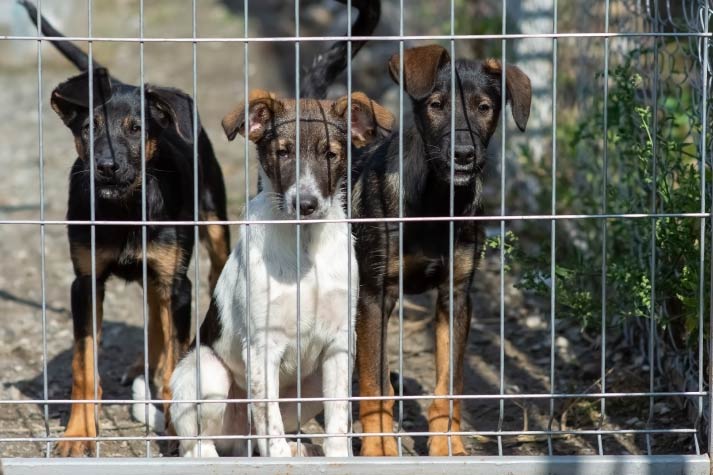
11 Jun
India’s Animal Welfare Sector Riddled with Fraud, Lax Oversight
Pune: In the absence of proper regulations, India’s animal welfare sector is facing a growing crisis. A surge in fraudulent shelters and exploitative boarding facilities has created an ecosystem where both animals and well-meaning volunteers are vulnerable to deception and abuse.
Unregulated and largely unsupervised, many shelters across the country now function less as sanctuaries and more as money-making enterprises, charging rescuers steep monthly fees while failing to provide even basic care. A high-profile case in 2024 highlighted this troubling trend when a shelter operating outside Delhi falsely used the name of People for Animals (PFA), the respected organisation headed by Maneka Gandhi.
"People have been calling me from across the country, particularly those familiar with our work at PFA, to inform us about this duplicity. An investigation is underway," Gandhi confirmed.
PFA’s Pune head, Puneeta Khanna, said many people who try to help animals fall short of committing to long-term adoption, thanks to a lack of resources or time. "They then relinquish the animals at any available shelter without conducting due diligence. They neither inspect the facilities nor research their credentials, simply transferring the animal and payments before disengaging completely. This prevalent behaviour enables fraudulent operations to flourish," she explained.
The internet has further enabled such malpractice, wherein imposters routinely create fake NGO pages on social media, hijack content from genuine organisations, and run fundraising campaigns under false pretenses. Emotive videos and photos are posted to manipulate donors, but the funds never reach the beneficiaries.
Richa Singh Choudhuri, who runs a senior dog shelter in Delhi, recounted how fraudsters hijacked her campaign visuals. "This recurring issue recently affected our campaign for Mozart, a dog requiring costly surgery for luxating patella. Scamsters already pocketed thousands before some people informed us about their posts, and we messaged them to shut it down and threatened them with legal action. While some perpetrators remove such posts when confronted, many persist, necessitating formal complaints," she said.
Post-pandemic demand for pet boarding services has also triggered a rise in unsafe, unqualified facilities. Many are run by people with no formal training or experience in animal care. One such case turned tragic for Bengaluru resident Pallavi Doshi, who lost her dog during a routine four-day stay at a local boarding centre. "Despite promises of daily updates, they did not send us anything and stopped picking up our calls... Later, we were informed by others who gave bad reviews to the facility that they too faced similar issues with their breed male dogs and suspected that they were sold to breeders," Doshi said.
Several such centres operate without standard hiring practices, often bringing in staff with no understanding or concern for animal welfare. Social media has shed light on instances of cruelty, including the death of a Cocker Spaniel at a Noida facility in October 2024 and the abuse of a Chow Chow at a Thane pet clinic in February 2025.
Vineeta Tandon of Animal Rescue Trust in Pune said the issue runs deep, with many shelters functioning without proper licenses or adherence to safety norms.
"Many just procure shop act licences and function ignoring safety guidelines. The Animal Welfare Board of India (AWBI) stipulates that shelters shouldn't retain healthy, self-sufficient animals or keep them caged. However, profit-driven facilities disregard this," she noted.
"Healthy strays are unnecessarily removed from their natural habitat by emotional activists who believe institutional care is superior. They often end up confined without proper sustenance, contrary to natural street existence where they enjoy freedom and regular feeding," she added.
In October 2024, officials rescued over 50 animals from a fraudulent shelter in Ravet, where the owner used fake veterinary documents and issued counterfeit receipts. Similarly, in June 2023, PETA India intervened to shut down an illegal hostel in Jodhpur known for abusive training methods.
Geetanjali Taur, founder of Saahas for Animals, has called for urgent reform.
"Transparency is key. When you find that an NGO is not being open for visitations and about their facilities or answering all questions, it should raise a red flag. But it's time clear rules, standards, and guidelines are set and strictly implemented across all animal-related businesses and charitable establishments. Volunteers must exercise prudence rather than making emotionally driven impulsive decisions that compromise animal welfare."
Meanwhile, legal protections remain weak. Meet Ashar, animal rights advocate and legal advisor for PETA India, criticised the limitations of the new Bharatiya Nyaya Sanhita (BNS). "While BNS removes different punishments based on the value of the animal and prescribes a uniform punishment for killing or maiming, irrespective of species, it has done more damage by totally removing the provision that penalised sexual abuse of animals," he said.
The sector now finds itself at a crossroads. Without urgent policy intervention and public accountability, India's animals will continue to fall through the cracks of a broken system, while bad actors remain unchecked.






AUTHOR’S BIO
Carry My Pet
Passionate pet enthusiasts and globetrotters, dedicated to easing furry friends' journeys worldwide. Penning tales of compassion at CarryMyPet, where every relocation is a tail-wagging adventure.